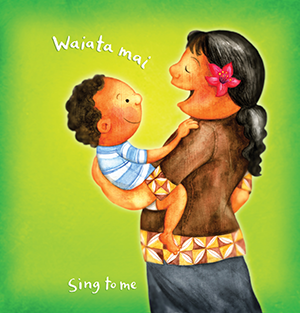
Waiata
Singing to baby is good for baby's development and for their connection to whānau, as well as being a lot of fun.
Singing to baby can be a rich, multi-sensory experience. It has many benefits, including sharing attention with baby and deepening baby’s attachment with whānau.
Ask whānau:
- Have you been doing any singing with baby since we met last?
- What sort of music does baby get to hear?
- How do they respond to that?
- What sort of music do you like?
- What do you think might be valuable about having music and singing around baby?
Affirm parents’ feedback. If necessary, point out to whānau the singing and music is important because it:
- is entertaining for baby and a way to have fun together
- is relaxing and encourages attachment with their whānau
- settles baby when they’re upset – especially familiar songs
- is a way to introduce topics in an informal way
- can be as as simple or complex as skills allow
- is a holistic way to learn, involving language, social, cognitive and motor skills
- is a universal means of communication.
Singing regularly
Songs can become part of baby’s routines. They’ll enjoy hearing the same songs over and over, and this repetition builds connections for hearing and language in their brain.
If whānau sing regularly with baby, they will show they recognise the songs by responding with excitement.
They’ll also learn to associate certain songs with certain routines – for example, lullabies with bedtime.
- What songs do you think baby recognises?
Anticipation
Whānau can make up simple songs using baby’s name, and they can sing to prepare baby for a routine activity like bath time or dinnertime. This helps baby learn what’s coming next.
Songs and family culture
Singing is a great way for baby to learn about their family’s culture and language. Some cultures tell stories about their traditions and ancestors through songs.
- Do you have any songs from your childhood that you remember?
Coordination and memory
Baby might move and sway to songs and music, which helps their balance, coordination and body awareness. They will also build memory skills as they learn the words and actions to rhymes and songs.
Baby would much rather hear parents sing than listen to recorded songs – just like hearing a recorded story doesn’t compare with cuddling up with a real person to read a book together.
Ask if the whānau would like some rhymes and songs.
How does this relate to Tākai resources?
Baby wall frieze – Waiata mai – Sing to me
Six things children need – Te aroha me te mahana – Love and warmth












